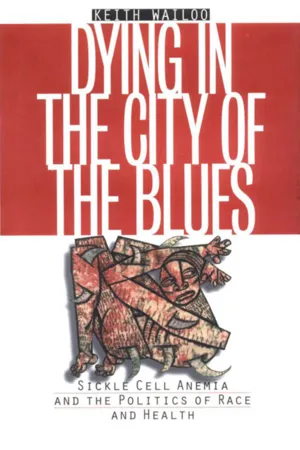
Dying in the City of the Blues
Sickle Cell Anemia and the Politics of Race and Health
- 360 pages
- English
- PDF
- Available on iOS & Android
About this book
This groundbreaking book chronicles the history of sickle cell anemia in the United States, tracing its transformation from an “invisible” malady to a powerful, yet contested, cultural symbol of African American pain and suffering.
Set in Memphis, home of one of the nation’s first sickle cell clinics, Dying in the City of the Blues reveals how the recognition, treatment, social understanding, and symbolism of the disease evolved in the twentieth century, shaped by the politics of race, region, health care, and biomedicine. Using medical journals, patients' accounts, black newspapers, blues lyrics, and many other sources, Keith Wailoo follows the disease and its sufferers from the early days of obscurity before sickle cell’s “discovery” by Western medicine; through its rise to clinical, scientific, and social prominence in the 1950s; to its politicization in the 1970s and 1980s. Looking forward, he considers the consequences of managed care on the politics of disease in the twenty-first century.
A rich and multilayered narrative, Dying in the City of the Blues offers valuable new insight into the African American experience, the impact of race relations and ideologies on health care, and the politics of science, medicine, and disease.
Frequently asked questions
- Essential is ideal for learners and professionals who enjoy exploring a wide range of subjects. Access the Essential Library with 800,000+ trusted titles and best-sellers across business, personal growth, and the humanities. Includes unlimited reading time and Standard Read Aloud voice.
- Complete: Perfect for advanced learners and researchers needing full, unrestricted access. Unlock 1.4M+ books across hundreds of subjects, including academic and specialized titles. The Complete Plan also includes advanced features like Premium Read Aloud and Research Assistant.
Please note we cannot support devices running on iOS 13 and Android 7 or earlier. Learn more about using the app.
Information
Table of contents
- Contents
- Acknowledgments
- Introduction. Pain and Suffering in Memphis
- 1 Conjurors of Health in the New South
- 2 Race Pathologies, Apparent and Unseen
- 3 Remaking Jim Crow Medicine
- 4 The Commodification of Black Health
- 5 Sickled Cells, Black Identity, and the Limits of Liberalism
- 6 Promising Therapy: Government Medicine on Beale Street
- 7 Pain and Policy at the Crossroads of Managed Care
- Conclusion. Race against Disease
- Notes
- Primary Sources
- Index
- A section of illustrations